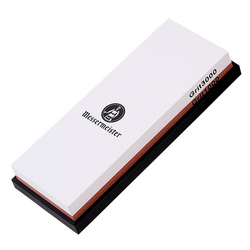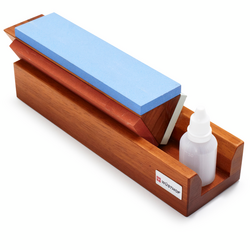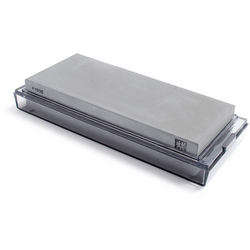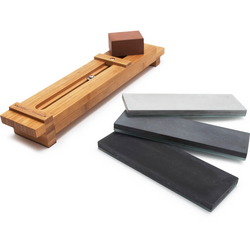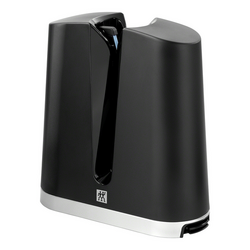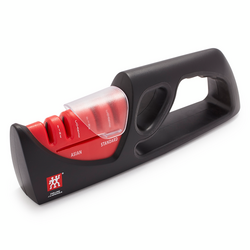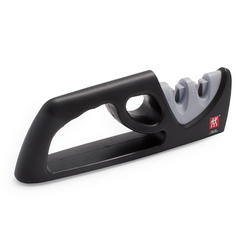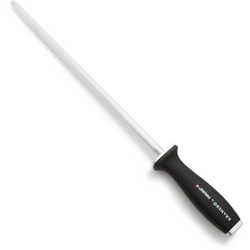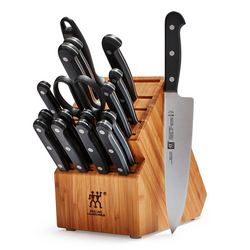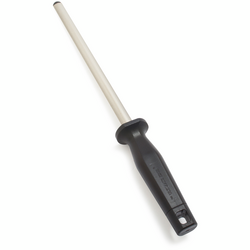-
(11)
Nice Stone...I would prefer a different base but two stone grits for a reasonable price
Pros: effectiveness, sharpens knives, easy to work with
Add to Bag -
(18)
Stone...I left the stone in the water how it says, after a while the stones just felt from the wood the glue doesn't hold them...I received the Wusthof Tri-Stone sharpener as a birthday gift recently. The three whetstones have a great mix of grit and...
Pros: effectiveness, sharpens well, ease of use
Add to Bag -
(1)
The double sided stone is convenient and easy to use and once you get the hang of it its fun running your knives against it.
Pros: ease of use, convenience, fun
Add to Bag -
(43)
It?s a great set of stones. I also like the bamboo sink support. It?s all very well made....Bob Kramer knife sharpening stone kit...Very similar to Shapton Glass stones....Some of the best stones made
Pros: instructional video, quality, effectiveness
Add to Bag
Sharpener Stones
Discover the art of maintaining your kitchen tools with our exceptional selection of sharpener stones. Perfect for both professional chefs and home cooking enthusiasts, these stones are essential for achieving precision and longevity in your cutlery collection. Crafted to cater to a variety of sharpening needs, they ensure that every slice, dice, and chop is executed with effortless ease. Elevate your culinary experience by keeping your blades in top-notch condition, ensuring consistent performance and safety in every use. Explore our range to find the ideal sharpener stone that complements your kitchen's demands and enhances your cooking adventures.
Sharpener Stones
In the art of cooking, much like in any craft, the quality and condition of one's tools can profoundly influence both the process and the final product. For culinary enthusiasts, professional chefs, and home cooks alike, maintaining the sharpness of knives is not just a matter of efficacy but also of safety and pleasure. A well-honed knife glides through ingredients with ease, preserving their texture and integrity. This is where the significance of sharpener stones comes into play. These essential tools are not just for the professional chef but are equally important for anyone keen on keeping their kitchen knives in top condition. Sharpener stones, available in various grits, allow for the meticulous honing and sharpening of knife edges, ensuring that they are razor-sharp for slicing, dicing, and chopping.
As winter gives way to the freshness of spring, the kitchen becomes a hub of activity, preparing for the vibrant produce that the season brings. It's a time when many consider refreshing their kitchen tools and techniques. Gifting sharpener stones during this season can be a thoughtful gesture for those who appreciate culinary arts or are looking to upgrade their kitchen prowess. Whether it's for a budding chef experimenting in their first kitchen or a seasoned culinarian looking to refine their craft, sharpener stones make for a practical and cherished gift. They not only enhance the cooking experience but also extend the life of valuable kitchen knives by maintaining their sharpness and functionality. For those who are particularly passionate about the precision of Japanese cuisine, exploring Japanese Sharpening Stones can be an enriching step towards mastering the art of knife maintenance.
Understanding the right type of sharpener stone to use can be as crucial as the sharpening technique itself. The choice of stone—be it water, oil, or ceramic—depends on the type of knives and the desired sharpness. Water stones, for example, are popular for their softer abrasive quality, which allows for a swift sharpening process, making them ideal for beginners and professionals alike. On the other hand, oil stones are prized for their durability and slower, more controlled sharpening, suitable for those who appreciate meticulous blade care. Each type of stone has its unique qualities and learning how to use them effectively can transform the mundane task of knife sharpening into a meditative, rewarding practice. As the blades glide over the stone, one not only hones a tool but also practices patience and attention—a subtle yet profound metaphor for the culinary arts. Whether honing an old family knife or a newly gifted chef's blade, the act of sharpening is a ritual that deepens one's connection to the tools and traditions of cooking.
As winter gives way to the freshness of spring, the kitchen becomes a hub of activity, preparing for the vibrant produce that the season brings. It's a time when many consider refreshing their kitchen tools and techniques. Gifting sharpener stones during this season can be a thoughtful gesture for those who appreciate culinary arts or are looking to upgrade their kitchen prowess. Whether it's for a budding chef experimenting in their first kitchen or a seasoned culinarian looking to refine their craft, sharpener stones make for a practical and cherished gift. They not only enhance the cooking experience but also extend the life of valuable kitchen knives by maintaining their sharpness and functionality. For those who are particularly passionate about the precision of Japanese cuisine, exploring Japanese Sharpening Stones can be an enriching step towards mastering the art of knife maintenance.
Understanding the right type of sharpener stone to use can be as crucial as the sharpening technique itself. The choice of stone—be it water, oil, or ceramic—depends on the type of knives and the desired sharpness. Water stones, for example, are popular for their softer abrasive quality, which allows for a swift sharpening process, making them ideal for beginners and professionals alike. On the other hand, oil stones are prized for their durability and slower, more controlled sharpening, suitable for those who appreciate meticulous blade care. Each type of stone has its unique qualities and learning how to use them effectively can transform the mundane task of knife sharpening into a meditative, rewarding practice. As the blades glide over the stone, one not only hones a tool but also practices patience and attention—a subtle yet profound metaphor for the culinary arts. Whether honing an old family knife or a newly gifted chef's blade, the act of sharpening is a ritual that deepens one's connection to the tools and traditions of cooking.

